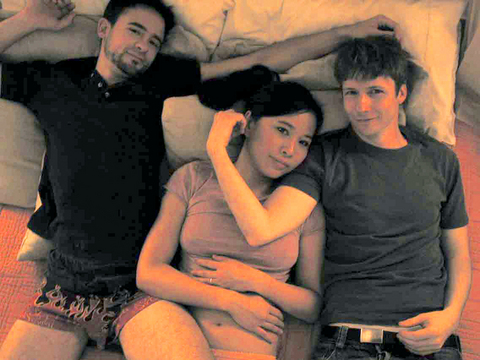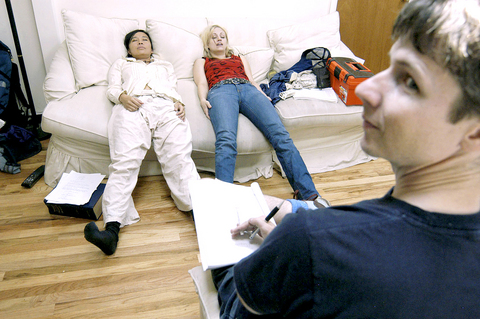In the crazy and no doubt kinky history of casting calls, there have surely been few like the one for Shortbus. It was all about sex, but not because the actors were coming on to the director. And not because the director was looking for big-name hotties to lure audiences into theaters. He wanted people whose sexual histories and hangups might become fodder for the screenplay. He wanted erotically adventurous recruits for an expedition to what he saw as an unexplored confluence of drama, comedy and unblinking pornography.
And so, on a Web site for what he cryptically called "the sex film project," the director, John Cameron Mitchell, solicited videotapes "of no longer than 10 minutes of you, the actor, talking about a true-life sexual experience that was very important to you." Any actor averse to having sex on camera, he added, need not apply.
Raphael Barker applied. On his tape he reminisced about a school trip to Spain when he was 12, and about an older boy there who taught him to masturbate. Lee Sook-yin applied. On her tape she talked about her struggle to become comfortable enough in her own body to experience sexual pleasure.

PHOTO: NY TIMES NEWS SERVICE
For them and the other half dozen other people cast in principal roles in the movie (which opens in New York on Oct. 4), the audition tapes were only the beginning of an odyssey that got no more ordinary -- and no less risque -- after that.
The unusual process occasionally blurred the line between reality and illusion. During improvisation workshops and rehearsals with Mitchell, the writer, director and star of the movie Shortbus, actors drew on aspects of their own lives to create their characters. Lee, for example, plays a woman searching for her first orgasm.
While Mitchell is credited with the final screenplay for Shortbus, the cast shares credit with him for the story. From the beginning, he said in a recent interview, "I realized that for the actors not to feel exposed, they would have to be co-creators with me of the piece. So that dictated how we were going to make it."

PHOTO: NY TIMES NEWS SERVICE
To overcome their inhibitions, they at one point found themselves playing a 100-person game of Spin the Bottle, replete with special tools to determine where, in a circle that large, the bottle was pointing. "We had a T-square and a tape measure," said Mitchell, who has a choirboy's face, a librarian's voice and a twinkle that suggests all the mischief just under the surface.
Much later on, when rehearsing a nude scene, Lee made a special request: "How about everybody in the room has to take their clothes off?" Mitchell, a cameraman and a few others obligingly stripped, and then they all got on with their work.
Although it has the style, pacing, oddball characters and unknown cast of many low-budget independent movies, Shortbus, which is unrated in the US, has sex scenes as graphic as those in a hard-core skin flick. That ensures it will be kept out of most theaters, but it also ensures attention that most films made on such a modest budget (about US$2 million) could not achieve.
Its characters orbit around a weekly Manhattan salon and sex party called Shortbus, named for the vehicle that ferries special-ed children to school. Lee's character, a couples counselor named Sofia, is brought to the party by two gay men, clients of hers who become the sponsors of her quest for sexual fulfillment. The two men meanwhile are searching for a third man to join them in bed and lend spark to their cooling relationship.
The salon in the movie has faint echoes of Shortbus, a monthly dance party that Mitchell used to organize at West 8th, a Greenwich Village club that has since closed, and of events at other Manhattan bars and clubs that he and people in his downtown demimonde frequented. Some of those people have parts in Shortbus.
Justin Bond, better known as the feminine half of the satiric cabaret act Kiki & Herb, plays the wry host of the salon, who looks out upon the free spirits at lusty play and tells Sofia, "It's just like the ?0s, only with less hope."
Back in 2003, on the Web site that solicited the videotapes, Mitchell warned, "We won't know anything specific about the story until we find the actors." But he outlined a general goal and tone. "In traditional Hollywood terms," he wrote, "this film would have the kind of humor and emotion of a film like Shortbus but with much more explicit sex." He went on to say that lead actors must "have a sexual rapport with another suitable actor."
How would he be able to determine that? After narrowing a pool of 500 applicants down to 40 finalists, he gathered them in Manhattan, put them in a theater on the Lower East Side and showed them one another's tapes. Using scorecards they graded each actor on a scale of one to four, with higher marks indicating a stronger likelihood of wanting to have sex with the person, Mitchell said.
Jay Brannan, who plays the man who becomes the gay couple's friend needed spark, remembered looking to his side and seeing that the actor next to him wasn't being as generous with ratings as he was. "I started feeling a little slutty and I downgraded everybody," he said. But as best he could recall, he gave high marks to Dawson and DeBoy, as they did to him. And thus a cinematic three-way was born.
A few months later the main players converged, day and night, in a loft on the Lower East Side that Mitchell rented. They played board games. They watched movies -- by John Cassavetes, by Robert Altman -- that had the kind of improvisatory, naturalistic feel he wanted to give his project. Outside the loft they played Whiffle ball and even bowled. Mitchell was trying to get them to relax around -- and trust -- one another.
Over the next two years, as he wangled money for the film from friends and supporters, including the musician Moby, actors drifted into and out of other commitments and improv sessions alternated with long breaks. "John would bookmark the best improvisations and then go away and create a script," Lee said. "We were giving him the raw material, and he would go away and connect a story."
Lee seemed to be the most unsettled of the group. After just a few minutes of talking about her experience, she asked to take a break, in order to steady herself. "There's this assumption that everybody's really cool about their bodies," she said. "I'm not. I'm as repressed as you are, maybe even more so."
She said she grew up devoutly Roman Catholic in Vancouver. She now lives in Toronto and is the host of an irreverent public radio program. Her bosses, she said, initially discouraged her from being in the movie. But she knew Mitchell, so she forged ahead, even though it meant that naked rehearsal. Even though it meant that marathon with Barker. Even though it meant masturbating in full view of camera.
She said she has forbidden relatives to see the movie. When a colleague at the Canadian Broadcasting Corp congratulated her on the film and told her he couldn't wait to see it, she said, "I was like: 'Gulp! No! There's a moratorium."'
The sex that cast members had in the service of the movie seemed to stay in that context; intimate scenes didn't appear to complicate relationships among the cast members. And Mitchell asked as much of himself as he did of his cast. For a scene that shows writhing bodies in a sort of sexual mosh pit, he jumped into the fray. Showing outtakes of that scene on a television set in his West Village apartment, he took note of the extras. "I knew some of these people," he said against a backdrop of moans. "Some were friends of friends."
He drew on friends for the principal cast as well. He has known Bond for about a decade. Both of them used to drop by an apartment in the Village where DeBoy held casual parties. The three saw one another regularly at a local restaurant, the Cowgirl Hall of Fame, where Bond performed an early version of the Kiki & Herb act. And Bond once judged a certain aspect of Dawson's physiognomy during a contest at a gay bar in the East Village.
On top of all of the other odd aspects of its evolution, Shortbus represented a reunion and collaboration of fringe artists moving closer to the mainstream. Kiki & Herb, for example, recently appeared on Broadway.
As for the film? It showed out of competition -- but to rapt interest -- at the most glamorous film festival of them all. "At Cannes, we had a 10-minute standing ovation," Bond said. "We were all standing there bawling."

Cheng Ching-hsiang (鄭青祥) turned a small triangle of concrete jammed between two old shops into a cool little bar called 9dimension. In front of the shop, a steampunk-like structure was welded by himself to serve as a booth where he prepares cocktails. “Yancheng used to be just old people,” he says, “but now young people are coming and creating the New Yancheng.” Around the corner, Yu Hsiu-jao (饒毓琇), opened Tiny Cafe. True to its name, it is the size of a cupboard and serves cold-brewed coffee. “Small shops are so special and have personality,” she says, “people come to Yancheng to find such treasures.” She

In July of 1995, a group of local DJs began posting an event flyer around Taipei. It was cheaply photocopied and nearly all in English, with a hand-drawn map on the back and, on the front, a big red hand print alongside one prominent line of text, “Finally… THE PARTY.” The map led to a remote floodplain in Taipei County (now New Taipei City) just across the Tamsui River from Taipei. The organizers got permission from no one. They just drove up in a blue Taiwanese pickup truck, set up a generator, two speakers, two turntables and a mixer. They

Former Chinese Nationalist Party (KMT) chairwoman Hung Hsiu-chu’s (洪秀柱) attendance at the Chinese Communist Party’s (CPP) “Chinese People’s War of Resistance Against Japanese Aggression and the World Anti-Fascist War” parade in Beijing is infuriating, embarrassing and insulting to nearly everyone in Taiwan, and Taiwan’s friends and allies. She is also ripping off bandages and pouring salt into old wounds. In the process she managed to tie both the KMT and the Democratic Progressive Party (DPP) into uncomfortable knots. The KMT continues to honor their heroic fighters, who defended China against the invading Japanese Empire, which inflicted unimaginable horrors on the

Hannah Liao (廖宸萱) recalls the harassment she experienced on dating apps, an experience that left her frightened and disgusted. “I’ve tried some voice-based dating apps,” the 30-year-old says. “Right away, some guys would say things like, ‘Wanna talk dirty?’ or ‘Wanna suck my d**k?’” she says. Liao’s story is not unique. Ministry of Health and Welfare statistics show a more than 50 percent rise in sexual assault cases related to online encounters over the past five years. In 2023 alone, women comprised 7,698 of the 9,413 reported victims. Faced with a dating landscape that can feel more predatory than promising, many in